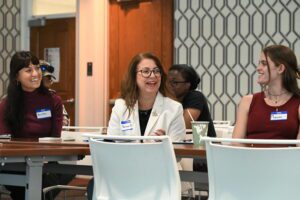By Catherine Komp, NC Local Newsletter Editor
It’s been another defining year for the North Carolina news and information ecosystem. From Murphy to Manteo, the efforts of journalists, civic information advocates, open government champions, technologists, audience teams, educators, researchers, funders and supporters all contributed to our collective effort to engage our communities and keep them connected and informed.
As the final weeks of 2023 unfold, NC Local is turning the mic over to some of our dogged and dynamic news and information friends to reflect on the last year. What were the biggest stories? How did you overcome challenges? What wins are you celebrating? How can the ecosystem strengthen local news in the new year?
Thanks to all who contributed to our year-end reflections. We’ll be adding a few more before the end of the year, so check back in this space for additional insights and resources.
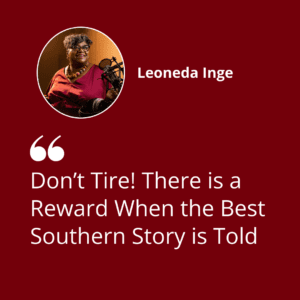 Leoneda Inge, Co-Host “Due South”
Leoneda Inge, Co-Host “Due South”
If you were to write a headline summarizing your entire year, what would it be?
“Don’t Tire! There is a Reward When the Best Southern Story is Told”
What stands out as the biggest story or stories in NC this year? And what angles deserve more attention in 2024?
One story I often think about is this year’s US Supreme Court decision to reject affirmative action at Harvard University and the University of North Carolina – Chapel Hill. A sentence I read in the New York Times hit me hard. It said the decision will likely guarantee the student population at these schools, and campuses like them, “would become whiter and more Asian and less Black and Latino.” The story angles are boundless in 2024. I was glad to have the opportunity to interview Heidi Kim, the new director of UNC’s Asian American Center, to address the topic.
What’s one journalistic New Year’s resolution you made for 2023, and did you stick to it?
In fall 2022, I was tasked with co-hosting the new WUNC public radio show, “Due South.” My New Year’s resolution was to keep a running list of interesting story ideas and pitches and find the “Southern” angle. A very hard, but rewarding task. I give myself a C+. I danced around the newsroom when I discovered one of the contestants in the new ABC reality series, The Golden Bachelor, lives in the same city I live in – Durham, NC. My interview with Patty James was delightful.
What are you most proud of from this past year and why?
I am most proud of developing a new public radio program from the ground, up. It is one thing to join a staff with a long-running program and mission, producers in place and awards already hanging on the wall. But, it is a different party when you have to develop a new program, find a new name, hire new producers and perfect a new style of storytelling. In October 2023, all that work paid off and “Due South” was on the airwaves and in podcast feeds.
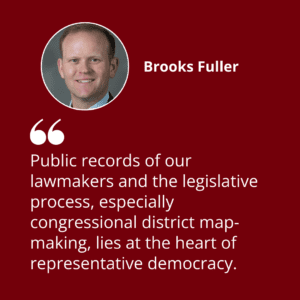 Brooks Fuller, director of the North Carolina Open Government Coalition and assistant professor of journalism at Elon University
Brooks Fuller, director of the North Carolina Open Government Coalition and assistant professor of journalism at Elon University
If you were to write a headline summarizing your entire year, what would it be?
Open Government Coalition stands up for press access, braces for what’s next
What stands out as the biggest story or stories in NC this year? And what angles deserve more attention in 2024?
No question that for us it was the passage of major public records exemptions covering the legislature and congressional redistricting. I’ve often said that public records of our lawmakers and the legislative process, especially congressional district map-making, lies at the heart of representative democracy. The legislature did real damage to the public’s ability to participate and that story and its implications are not going away anytime soon.
What’s one open government challenge you faced this year & what helped you solve it?
We heard from dozens of people across North Carolina who were quoted exorbitant fees for public records that likely have no basis in the law. With the help of some rightly decided trial court opinions and zealous public advocacy from all kinds of open government watchdogs, we were able to help convince government agencies to reverse course and hand over documents. We stood up for regular folks and we won. We could not have done this without journalists and other concerned citizens speaking up and speaking out.
What’s on your wish list for 2024 when it comes to open government and public information?
Top of the list is a repeal or rewrite of the legislative privilege exemption to the public records law. The law is so wildly overbroad that it threatens access to even the most basic information about what our legislators are up to. There is no reason to treat legislators differently than any other public servant. Second is membership growth. Our coalition has seen slow and steady growth for years, but with the new threats to transparency, we need more and more diverse partners throughout the ecosystem to fight for access. The financial cost of membership is very low, but the benefits are enormous and could help our communities in unfathomable ways.
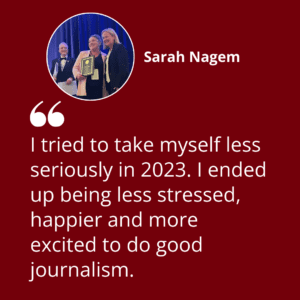 Sarah Nagem, editor, Border Belt Independent
Sarah Nagem, editor, Border Belt Independent
What are you most proud of from this past year & why?
I’m most proud of the collaboration between the Border Belt Independent and The Assembly to investigate the Columbus County Sheriff’s Office. I teamed up with Carli Brosseau, a fantastic investigative journalist at The Assembly, to dig deep into the federal investigation of former sheriff Jody Greene. The BBI’s roots in Columbus County combined with Carli’s expertise, particularly when it comes to public records, have resulted in meaningful stories that go beyond other news organizations’ coverage. That’s especially important for readers in a place like Columbus County where local government lacks transparency.
What’s one journalistic New Year’s resolution you made for 2023, and did you stick to it?
I wouldn’t say it was a New Year’s resolution, and I wouldn’t say it was totally work-related, but I tried to take myself less seriously in 2023. I ended up being less stressed, happier and more excited to do good journalism.
What’s on your wish list for 2024 when it comes to local news and information?
I hope more news outlets will join forces to tell important stories. When newspapers, digital organizations, TV stations and radio stations team up, they can produce exceptional journalism and share it with a wide audience.
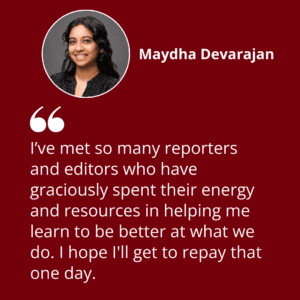 Maydha Devarajan, managing editor of CityView
Maydha Devarajan, managing editor of CityView
What local news challenge did you face this year & what helped you solve it?
The biggest local news challenge I’ve faced this year is still ongoing — I started my new job as managing editor of CityView Today, a Fayetteville-based online news organization, in October. It’s hard to believe it’s only been a few months! At CityView, we’re building out a news product and shaping a collective vision of how we’re adding to a news ecosystem in Fayetteville and Cumberland County. It’s a venture that’s both exciting and daunting. In just a few months, we’ve expanded our news staff and launched a newsletter, with even bigger plans ahead in 2024. And something that has made itself clear to me over the past few months is the importance of a truly collaborative working environment. Solutions come through collaboration and open communication, and I’m lucky to be on a team with someone like our executive editor (and North Carolina local news legend) Bill Horner III, who knows the value of both.
What resources or tools helped you this year that would help others in the ecosystem?
I owe so much of my growth in the past year to my mentors — informal and formal. I’m grateful to so many who have lent me their time and perspectives this year when I’ve struggled through reporting a story, had doubts about my place in the journalism industry, or needed advice on long-term career decisions. I wish I could provide a tangible link or list of specific tools to encapsulate what my mentors have given to me this year, but for other North Carolina early-career journalists, I would emphasize the importance of resources like the N.C. Local News Workshop and of affinity groups (shoutout to the Asian American Journalists Association Mentorship Program!). In every North Carolina newsroom that I’ve been in, I’ve met so many reporters and editors who have graciously spent their energy and resources in helping me learn to be better at what we do. I hope I’ll get to repay that one day.
As we wrap the year up with some down time, do you have any local book, music or podcast recommendations?
I’ve watched them on YouTube on and off over the years, but I love “Ear Biscuits with Rhett & Link.” I’m cheating a little bit with this answer because it’s not a podcast that’s produced locally, but Rhett McLaughlin and Link Neal (from “Good Mythical Morning”) were born and raised in North Carolina, so I think it still counts! I find that it’s a podcast that’s quite calming to listen to when driving or going for a run, and I always get excited when I hear a North Carolina reference thrown in here or there.
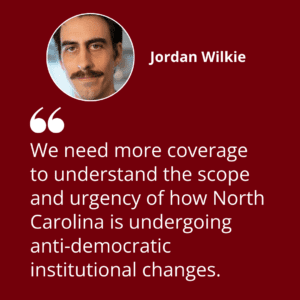 Jordan Wilkie, freelance reporter and project manager
Jordan Wilkie, freelance reporter and project manager
What stands out as the biggest story or stories in NC this year? And what angles deserve more attention in 2024?
The United States is a backsliding democracy. We need more coverage to understand the scope and urgency of how North Carolina is undergoing anti-democratic institutional changes, and we need clarity from our news outlets that these changes are being driven by the Republican party.
Here is a brief list of illiberal threats to maintaining a democracy in North Carolina. All of this has been reported by North Carolina outlets. We could do a better job of telling the overarching story of North Carolina becoming less democratic. These developments also deserve more coverage and attention at all levels of news outlets across the state.
- The budget contained many anti-democratic provisions, including: legislative exemption from public records laws, expansive authority given to the Joint Legislative Commission on Governmental Operations, and the prevention of the state from joining the Electronic Registration Information Center.
- Senate Bill 747/SL 2023 – 140 and Senate Bill 749 / SL 2023-139 include several provisions from the wishlist of anti-democratic activists pushing conspiracies about corruption and fraud in election administration and grants the legislature additional authority over election administration in addition to setting the actual laws.
- Republicans, after winning a majority of seats on the North Carolina Supreme Court, reversed two recently decided cases and pulled a third from the Court of Appeals to decide it quickly, all against the interest of a healthy democracy. The cases allowed partisan gerrymandering, approved a state law requiring voter ID previously decided to be racially discriminatory, and upheld a racially discriminatory state law preventing people convicted of felonies from voting for a period of time even after being released from prison.
- The Republican-controlled state legislature is drawing new gerrymandered maps for the state House, state Senate and U.S. Congress. (In New York, Democrats are drawing new maps, and though that state disallows partisan gerrymandering, Democrats are trying to thread the needle on competitive districts so they can win back several seats. We can see how illiberal policies in one state have ripple effects across the country.)
- Tim Moore and Phil Berger, leaders of the state House and Senate, pushed a legal theory all the way to the U.S. Supreme Court that would have given them immense power over setting election laws unchecked by state courts or the governor and would have changed democracy across the U.S. as it has been practiced to-date. The Court rejected that argument in June. Congressional Republicans, several Republican governors and Donald Trump attempted to use that same legal theory to overturn the results of the 2020 election and likewise failed, leading to the storming of the U.S. Capitol on January 6, 2021.
- U.S. Representatives Dan Bishop, Virginia Foxx, Richard Hudson, Gregory F. Murphy, and David Rouzer each voted against certifying the 2020 election on January 6 after the Capitol was stormed and still serve in office. Recently, they each voted to open an impeachment inquiry into President Biden despite the fact that the party has not offered evidence of its claims against the president. In political science circles, this is called “rule by law” rather than “rule of law.”
- Despite being elected as a Democratic Party candidate, Tricia Cotham switched parties to give Republicans as supermajority, allowing them to override the “check and balance” of a gubernatorial veto. This was our last remaining check on the legislature in the state after the state courts described wide latitude for legislative action in their decisions overturning the court’s previous decisions.
- Mark Robinson, by the criteria laid out by Harvard political science professor Steven Levitsky, is an antidemocratic candidate. He fails to condemn political violence, accept the 2020 presidential election results, and or denounce anti-democratic activists. The political use of dehumanizing language is a risk factor for politically motivated violence, often taking the form of hate crimes, and Robinson’s use of such language against LGBTQ+ people and people who practice Islam is well documented. Robinson has close ties with Jim Womack, president of the North Carolina Election Integrity Teams, a group born out of the Big Lie movement and which has been in communication with the state legislature as it passes anti-democratic reforms to election administration.
Journalists are at a disadvantage in telling the story of democratic backsliding in North Carolina because we do not have many state-level organizations documenting the deterioration in our liberal norms and institutions. The New York Times underwent a tonal shift in covering Donald Trump as an antidemocratic candidate only after he was indicted on 91 felony charges, the January 6 Committee released its report and over a year of additional blow-back from the insurrection had accumulated. State level news outlets do not have the luxury to wait for such extensive institutional cover before reporting on the overarching narrative of democratic backsliding in North Carolina. The norms and institutions protecting our state-level democracy are weaker than those protecting the federal system and have already been subverted for some years.
What’s on your wish list for 2024 when it comes to local news and information?
I’d like to see newsrooms invest in research and development. North Carolina is well-poised to be one of the most innovative states for news collaboration in the country. I’d like to see us make the next step. To do this, of course, we need funders and philanthropists to show up in a big way.
I’d like to see newsrooms across the state use audience input to drive accountability coverage for candidates and government. I’d like to see local newsrooms cover election administration using pro-democracy framing. I’d like to see journalists and researchers collaborate to document the harms of politically motivated violence, a particular threat faced by LGBTQ+ communities across the state. I want the state’s small newsrooms to explore streamlining their collective bureaucracy by joining together as a professional employer organization (or one of any number of models) while maintaining their editorial independence. I’d love to see newsrooms look five years into the future and know they’d be better off if they started developing a pipeline of reporter talent, then partnering with community colleges to start that development. Anyone interested in any of these ideas should contact me.
What resources or tools helped you this year that would help others in the ecosystem?
The Tiny News Collective has been a huge support to me this year. I’d encourage anyone looking to start a news service of any size to reach out to them. Jennifer Brandel, founder and CEO of Hearken, continues to be a mentor and a savior. She’s one of the brightest minds in journalism today and is a consistent inspiration.




